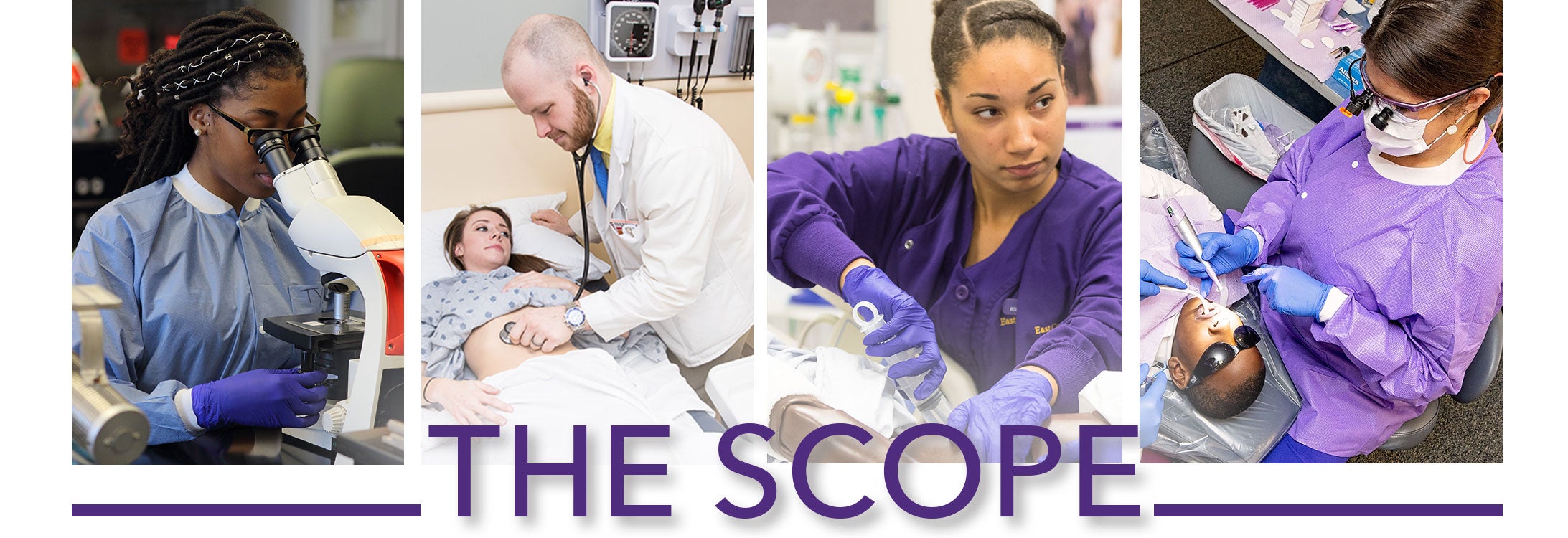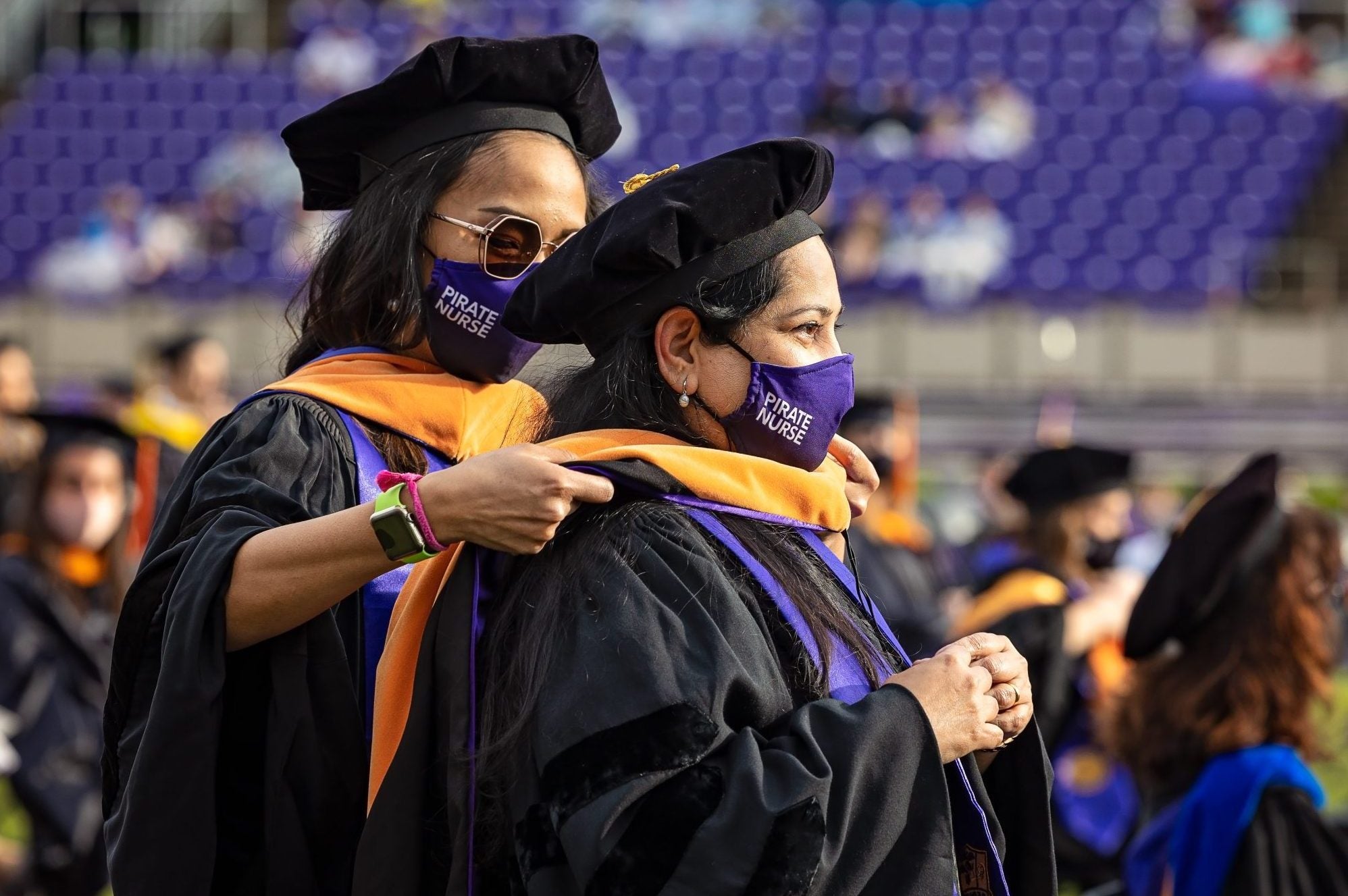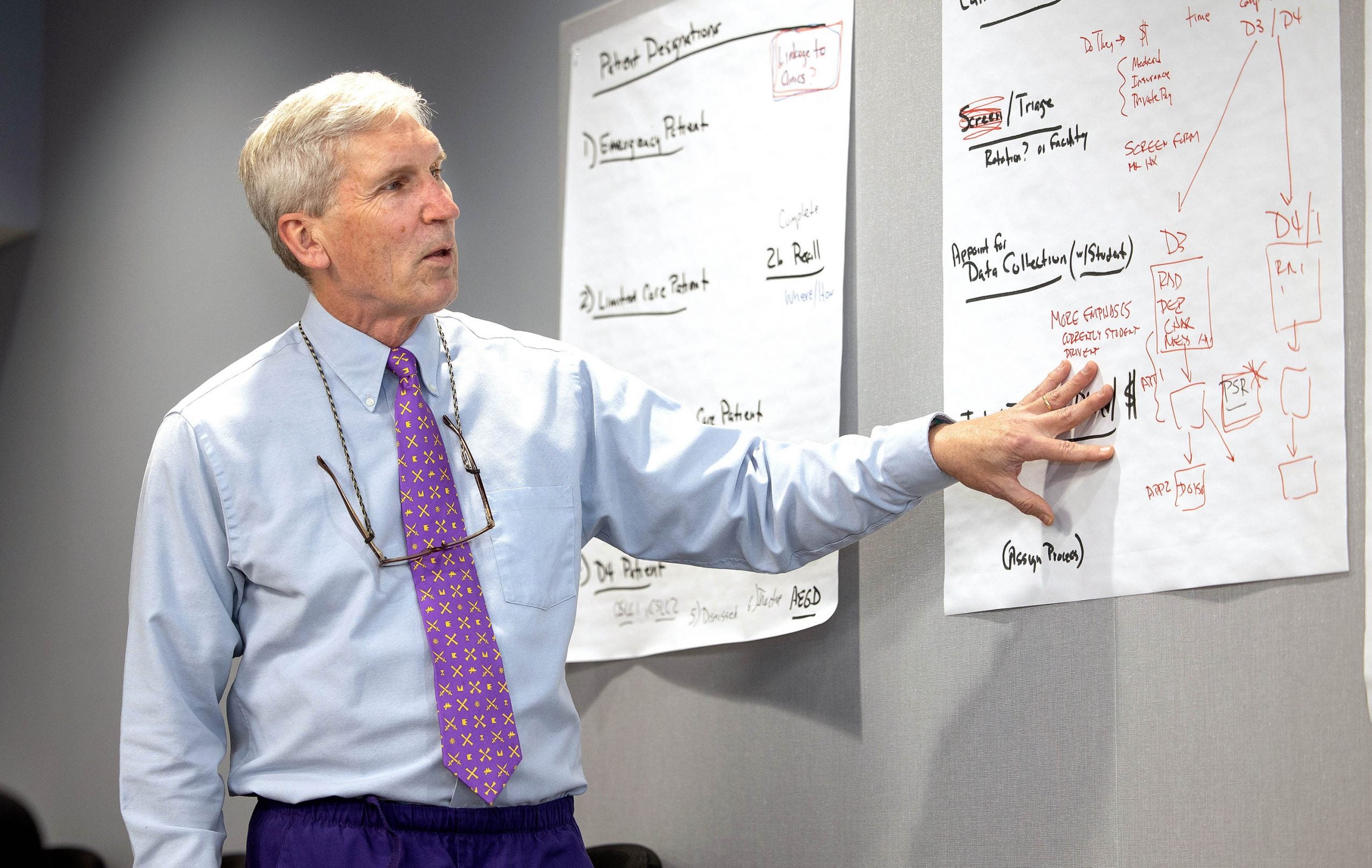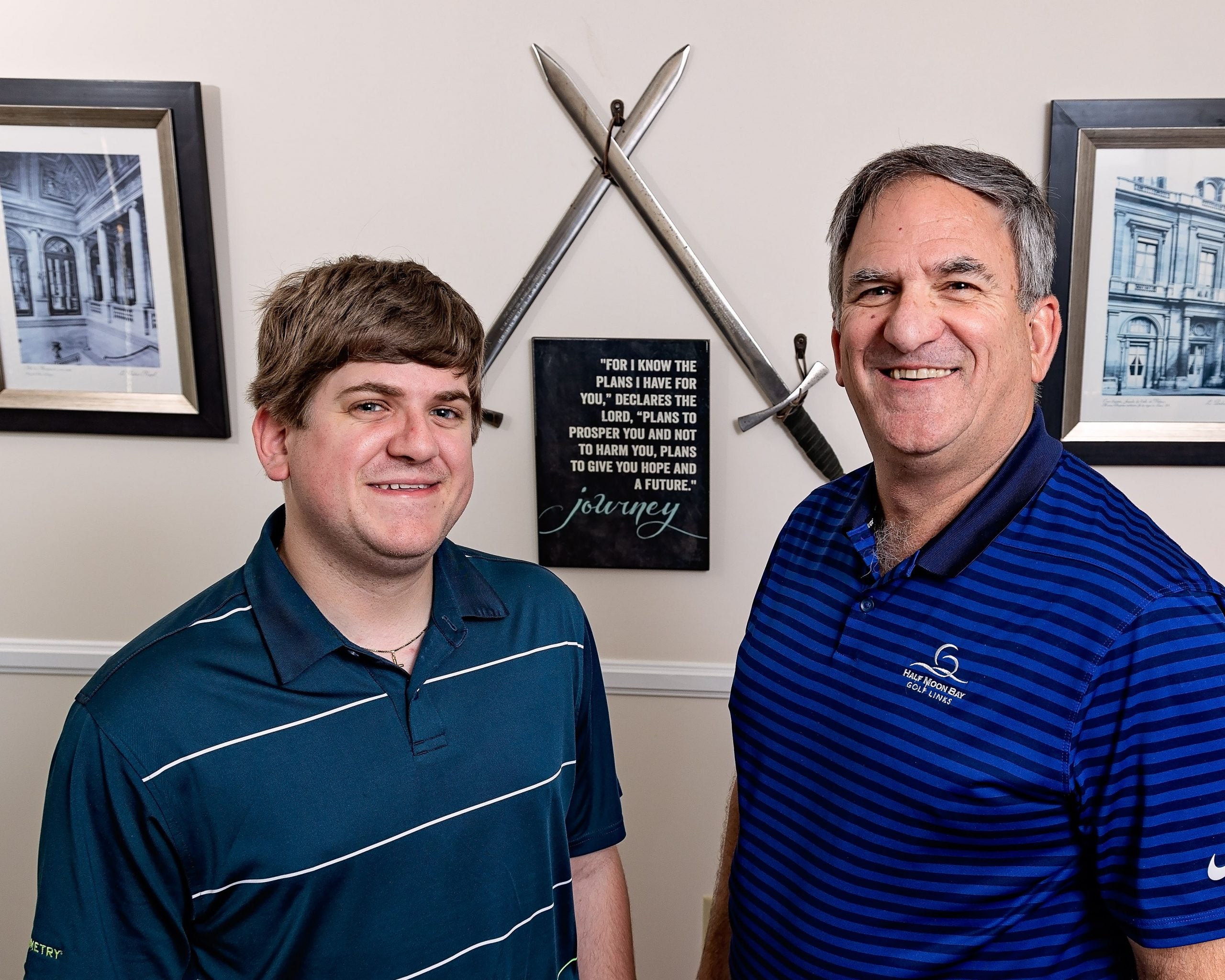May 2021
Welcome to “The Scope,” the newsletter of the ECU Division of Health Sciences.
Welcome to the May 2021 issue of The Scope, the newsletter of the ECU Division of Health Sciences.
As I am sure many of you already know, I have agreed to serve as interim dean of the Brody School of Medicine. I accepted this role when asked by Chancellor Rogers because I believe in Brody’s mission and the vital role it plays in our community and region.
For those who do not know me, I have been a Brody faculty member for nine years, five as the chair of the Department of Pediatrics. I am a captain in the U.S. Navy Reserves and spent 2020 recalled to active-duty military service overseas.

Dr. Jason Higginson
I was drawn to Brody in 2012, after serving 13 years in the U.S. Navy, because of the similar focus on mission-based work and a commitment to service. My entire life has been ordered around these tenets. At Brody, I have discovered that I am surrounded by people who are mutually inclined to a life of mission and service and that is why I love Brody and Greenville.
My leadership philosophy is that leaders must serve the mission and the people who are doing the mission. As interim dean, I will serve as custodian of the school’s mission until the next Brody dean is appointed. I plan on utilizing my time in this capacity to facilitate continuity of the great work performed daily by our students, faculty, and staff, who I believe are the heart of Brody.
In partnership with my Brody colleagues and Dr. Ron Mitchelson, interim vice chancellor of ECU’s Division of Health Sciences, I will work to strengthen the school’s finances, ensure stability in our relationships with our health care partners, and recruit and retain valuable personnel.
I believe everyone deserves the opportunity to perform at their best in a workplace that is supportive of personal achievement and recognizes that everyone in the organization has a part to play in Brody’s success. Working to optimize relationships is not only critical for ensuring Brody’s future, but also—and even more so—important for ensuring the future of patients who are looking to us to improve their health and well-being.
I hope you will join me in the hard work ahead necessary to advance our mission. Together, we will continue to build Brody’s outstanding legacy and I look forward to serving you in this role.
Jason Higginson, MD
Interim Dean, Brody School of Medicine
Commencement
This spring, the division’s graduates were able to celebrate their achievements in person.
On May 7, ECU held three Commencement ceremonies, and division graduates participated in the events held in Dowdy-Ficklen Stadium. Some of the division’s graduates were featured in university news coverage because of their unique paths to graduation.
Travis Barton graduated this spring with a Bachelor of Science in clinical laboratory science, part of the College of Allied Health Sciences. He plans to join his wife in his home state of Texas, where she is stationed in San Antonio, and will use the skills he’s sharpened at ECU to pursue a career as a blood bank supervisor.
After high school, Barton joined the U.S. Navy as a corpsman — the Navy’s version of a medic — and took an assignment to work as a lab technician. He finished the six-month military training program and then spent three years working in the naval hospital in Guam. There, he worked in the laboratory and was eventually promoted to blood bank supervisor. He quickly developed an appreciation for the work.
“The blood bank is very fast-paced, but it’s also very black and white,” he said. “There’s no middle ground. It’s yes or no kind of answers, and it really can change someone’s life. It can save someone’s life in a matter of minutes.”
Dalton Brooks III, who earned his Doctor of Dental Medicine degree from the School of Dental Medicine, will join his father’s practice in Lumberton, where he will also encourage other members of the Lumbee Tribe of North Carolina to pursue their dreams.
“I’ve always been around dentistry, and for the longest time knew I wanted to do something in the medical field,” Brooks said. “It wasn’t until my early college days that I really formed a passion for dentistry. Witnessing the impact my dad had on not only his patients’ smiles, but their lives, really solidified dentistry for me.”
As other new dentists will be starting practice or pursuing residency training, Brooks also has an entire community at the heart of his decisions for plans after graduation. He is anxious — but excited — to begin his career and watch his goals come to fruition. He is also ready to be a role model for others who dream big.
“I can start giving back to the community that has given me so much,” Brooks said. “There are countless people that have touched and shaped my life tremendously. By returning to my community, I can give back through dentistry and show everyone what they have invested in.”
Also ready to embark on their next steps in health care careers, three Brody Scholars in the Class of 2021 reminisced on their days at Brody, from first donning their white coats to commencement. Dr. Lindsey Burleson, Dr. Jessie Tucci-Herron and Dr. Ann Tooley compared experiences as they prepare to begin residencies in different cities.
“It’s incredible that it’s actually here,” Tooley said. “You’ve actually been working toward it your whole life. … It’s not just been the past four years, it’s been college, it’s been before that — whenever you made this decision that you were going to pursue this field — the culmination of years and years and years of hard work.”
Another Brody graduate reflected on her medical school journey as well.
On Aug. 4, 2017, Brittany Means Lee (or Brittany Lorraine Means as she was known then) was called up to the stage in the Brody School of Medicine’s Auditorium to put on her white coat for the first time. The white coat ceremony is both symbolic and a milestone moment when medical students receive the white coat they will wear in clinical spaces during their time at ECU.
“I was just so happy. I really just didn’t think about the white coat itself because I was so happy about the days before that, and even being there,” Lee said shortly after the ceremony.
A videographer with ECU News Services interviewed Lee after she received that white coat in 2017 and replayed portions of the video for her as she prepared to graduate as a physician with the Class of 2021.
“All of the things that I talked about (in 2017) are just as true today. Knowing that I had the faith then, I had the support then — I still have that same support now,” she said.
Lee’s next milestone will be the start of her three-year residency program on June 14. After that, she might like to practice outpatient medicine. But with her mentors being in outpatient and inpatient medicine, as well as in academia — her calling may evolve, like her life has the past 12 years.
“(If you) put your mind to, your heart to and whatever you think God has called you to do – definitely, you can succeed,” Lee said. “Just the fact that I’m here, like I made it, like it really happened — just affirmation.”
Visit this video on YouTube for the closed-captioned version.
Visit this video on YouTube for the closed-captioned version.
Patient Care
Across eastern North Carolina, conversations are cropping up about health and health care—but these discussions aren’t taking place in doctors’ offices.
They are happening outside factories, at automotive garages, on the edges of farm fields, in the parking lots of neighborhood churches and even on the Outer Banks—and they are part of an effort by the Brody School of Medicine at East Carolina University and the ECU Division of Health Sciences to bring health care to people in the East who have more difficulty accessing the care, resources and information they need to live a healthy life.
Brody and division providers are using specially equipped vans to literally drive health care into communities in rural and under-resourced areas of the region. Made possible through CARES Act funding and strong community partnerships, the project paves the way for COVID-19 vaccinations and health screenings to reach people who live and work in rural counties.
The project is led by Dr. Paul Bolin, chair of internal medicine at ECU’s Brody School of Medicine, and Dr. Paul Shackelford, clinical professor of obstetrics and gynecology and research professor for internal medicine at Brody. The two set out initially to address hypertension, diabetes and obesity—three conditions that plague eastern North Carolina and can lead to serious health complications. The team adapted as the pandemic emerged and made plans to administer the vaccine as well.
With two vans and a trailer modified as two exam rooms, the teams head out across the East multiple times a week, depending on scheduling. So far, they’ve traveled to the Outer Banks, Pasquotank and Pender counties, Kinston and other rural communities in the region.
So far, the vans and their teams, which include providers and volunteers from all over the ECU Division of Health Sciences and community partners, have been to seven counties, conducted nearly a dozen health screening events and administered more than 1,000 COVID-19 vaccinations.
The project was created using the bare bones of the division’s—and ECU’s—missions.
“It is very apparent that we have a number of populations in eastern North Carolina that suffer from poor access to care. The only way we’re going to solve this is to go to them,” Bolin said. “It is our mission. To serve is to meet a person where they are. It’s absolutely key.”
That concept keeps the promise ECU made to improve the quality of life and health for people in the East and beyond. It also became more urgent with the emergence of the pandemic.
“If you take the top five or six causes of mortality in eastern North Carolina,” Bolin said, “they align with the leading risk factors of mortality from COVID-19.”
To gear up for a typical day when the vans provide both health screenings and the vaccine, providers prepare the night before, getting machines and tools packed and ready to go at dawn—or earlier. At the scheduled destination, the machines are allowed to warm up before screenings begin. Each person then spends about 10-15 minutes with a health care provider, depending on their needs and follow-up recommendations.
The visits have been rewarding for patients and providers alike.
“The work is informing a way to provide services to eastern North Carolina,” Shackelford said, “We’re beginning to see an opportunity to rebuild a system to meet people where they are physically, where they are in time, and where they are spiritually.”
Winterville Councilman Ricky Hines said the mobile unit’s visit to Rebuild Christian Center Church was a “breath of fresh air” for the town’s residents because it meant that they could get vaccinated in their own community.
“That’s what it’s all about, being accessible. Especially in communities where people are a little hesitant. But if they see that you’re coming into their community… and if they see people that they recognize getting the shots, it kind of makes it easier for them,” Hines said. “For ECU to come out, it just proves that if you go to the people, people will get things done.”
This initiative can be supported through ECU’s Pandemic Response and Research Fund.
Visit this video on YouTube for the closed-captioned version.
Innovation
Several recent projects and events based in the division have also impacted patients across the region using new and creative strategies.
A team of health researchers has been using biofeedback to help patients manage involuntary bodily functions such as blood flow, blood pressure and heart rate. Now, they’re examining their work’s potential uses for those recovering from COVID-19.
The Biofeedback Lab is led by Dr. Linda Bolin, assistant professor in the College of Nursing’s Department of Nursing Science and is housed in the Health Sciences Building. There, the team examines how biometric markers such as blood pressure can be communicated in real-time, allowing the user to connect have a deeper understanding of their body’s health in the moment, and make adjustments accordingly. Projects based in the lab include undergraduate and graduate students and faculty from the College of Health and Human Performance and the College of Allied Health Sciences’ Department of Addiction and Rehabilitation Studies.
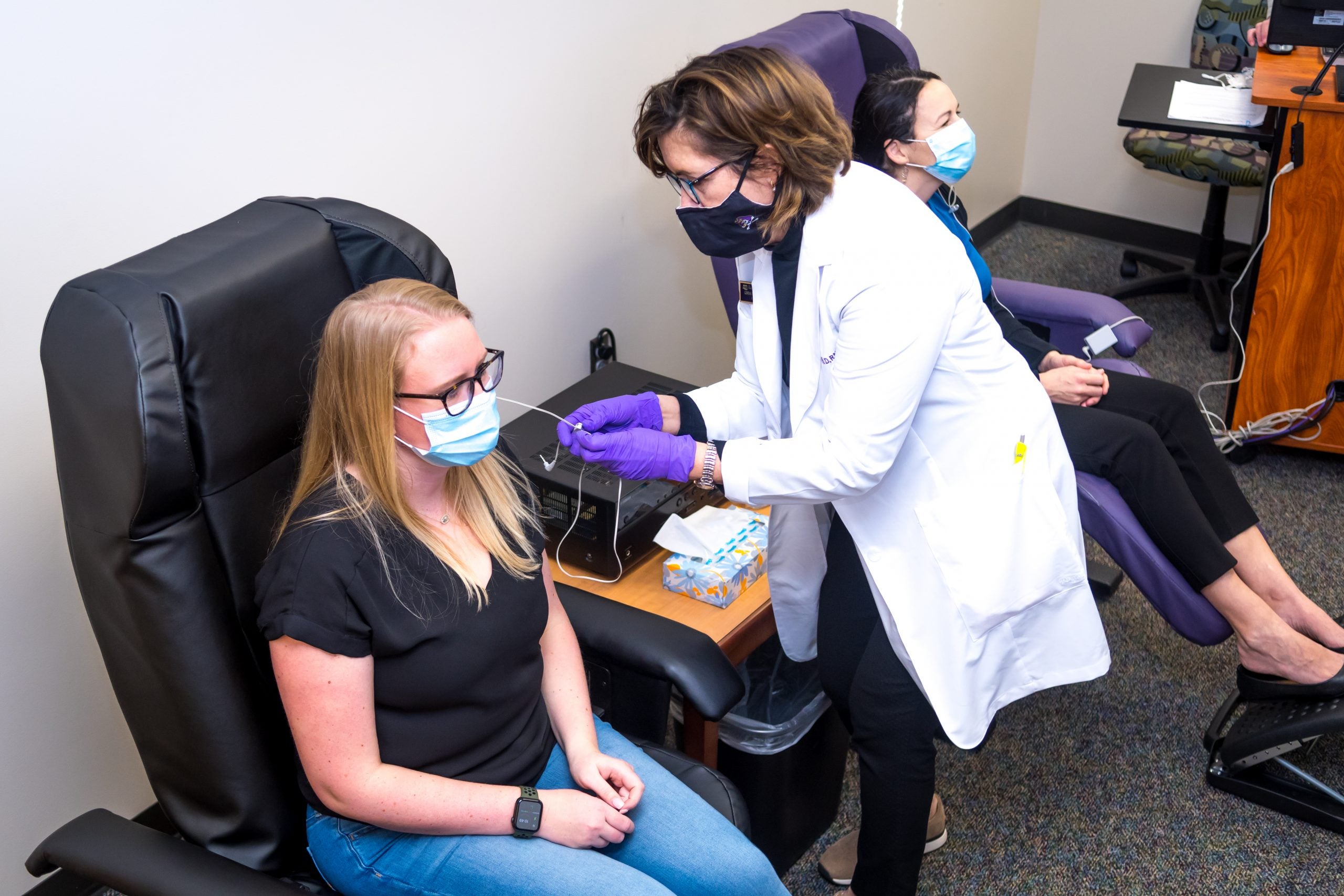
Dr. Linda Bolin and PhD student Amelia Saul demonstrate sensors and equipment used in biofeedback, which helps patients manage involuntary bodily functions including blood flow and heart rate. (Contributed photo)
“Biofeedback training teaches the participant how to self-regulate their physiology. Through self-regulation, the participant may gain a sense of autonomy because they begin to realize how the mind-body connection works,” Bolin said. “Through small changes such as taking 10 minutes to practice paced breathing, an individual can begin to improve their overall physical and mental health.”
The Biofeedback Lab, through the support from the ECU Medical & Health Sciences Foundation, is a collaborative effort than spans both ECU campuses, including providers from the Department of Addiction and Rehabilitation who also work in the Navigate Counseling Clinic, the College of Allied Health Sciences’ free clinic that offers counseling services to individuals, families and groups. Undergraduate and graduate students in the College of Nursing also work on various research projects as well as HHP’s Departments of Kinesiology and Recreation Sciences.
The lab has also been beneficial in aiding patients through the College of Allied Health Sciences’ Navigate Clinic, which provides free counseling services through innovative interventions.
“We have used the lab as a way to provide additional services to clients being seen though our Navigate Counseling Clinic,” said Dr. Celeste Crawford, clinical assistant professor in CAHS Department of Addiction and Rehabilitation Studies. “Biofeedback can be a very beneficial intervention to aid in pain management, reduction in anxiety symptoms and management of symptoms related to traumatic experience/events.”
The College of Allied Health Sciences’ Student Occupational Therapy Association (SOTA) has been working with children at Third Street Academy to develop screenings and interventions that will assist the younger students in their development. Dr. Lauren Turbeville, assistant professor in occupational therapy and SOTA’s faculty advisor, established the partnership so that OT students would gain experience working with the community. The ECU students assisted the children through handwriting screenings as well as fine motor and sensory interventions designed by students of Dr. Healther Panczykowski, assistant professor.
The SOTA members spent several Saturdays volunteering to clean the school building and donated $700 to Third Street Academy as their annual community donation, in honor of the partnership between the OT students and schoolchildren.
DHS Spotlight
In the spirit of excellence in education and a collaborative campus, we will be highlighting a variety of students, staff and faculty who represent the colleges and schools in the Division of Health Sciences.
This month, we meet Dr. Mark Moss, associate professor in the School of Dental Medicine.
Growing up in Stevens Point, Wisconsin, Dr. Mark Moss listened to the advice of his parents, who told him of the importance of education to his future.
The associate professor in the School of Dental Medicine decided on dentistry without a full realization of its importance.
“My focus when I chose dentistry was on making enough money to have a comfortable living. I soon realized that that is not a very good basis for career decisions,” Moss said. “Once my understanding (grew) of the way oral health fits within the wider framework of health care, I became very interested in learning as much as I could to better understand why some people do not have access to oral health care.”
Moss landed at ECU four years ago, drawn to the mission of the School of Dental Medicine.
“The whole premise of the school is to address underserved communities in North Carolina,” he said. “The mission of the School of Dental Medicine is what drew my curiosity about this place, but the people that work here and the students that we serve make it a dynamic setting for teaching and learning. To me, that is what a university is all about — community engagement with a focus on scholarship and health improvement.
“I consider it a true privilege to work alongside the future leaders of dentistry in North Carolina. I also am a learner in this adventure. The gap between public health and clinical practice is wide, and there is a need to find ways to bridge the gap for our underserved and disadvantaged populations. The ECU School of Dental Medicine is uniquely positioned to address this gap, and I have the honor of helping out in the workforce deployment process for oral health — to execute the vision and mission of the ECU School of Dental Medicine.”
Philanthropy
The Scope will occasionally highlight donors to ECU’s Medical & Health Sciences Foundation, who will share the stories and reasons that contributed to their decision to give. This month, we feature Tommy and George Pate, a father-son team from the Ayden-based financial advisory firm The Journeys Group.
Tommy Pate is a Tarboro native who graduated from North Carolina State University in 1982. He began working in insurance sales before shifting his focus to financial planning. Pate founded The Journeys Group in 2002, offering financial strategies based on each client’s unique goals, priorities and dreams.
George Pate grew up in Greenville and graduated from Wake Forest University in 2017 where he helped to lead the Wesley Foundation. The biology major conducted Alzheimer’s disease-related research in a lab at Wake Forest Baptist Health for a year. He too pivoted professionally, opting for a career in financial advising because it was a more fast-paced profession where he could make more of a difference in peoples’ lives.
The Pates recently made a gift to ECU’s Pandemic Response and Research Fund, which supports dozens of projects currently underway on ECU’s Health Sciences Campus that range from stopping the spread of COVID-19 to expanding treatments to the rural and medically underserved populations across eastern North Carolina.
This is the first time either Pate has publicly discussed their philanthropy, but they said they chose to do so because they believed in ECU’s mission.
Q: Why did you choose to support the ECU Pandemic Response and Research Fund?
Tommy Pate: “There are two very distinct reasons. First is, I have a lot of confidence in Shack (Dr. Paul Shackelford); he has been a friend of mine for years. … The other reason is, we are firmly convinced that what success we have comes from the good Lord and you’re supposed to give back. We don’t usually talk about it, because we try to do it anonymously. … So in this case, we could support Shack and the Brody School of Medicine, it was a good cause – where people who didn’t have the opportunity to get vaccinated are being given the opportunity to do so – and we could also do what we think we are biblically supposed to do, all in one stroke.”
George Pate: “We’ve known Shack’s family for a good 25 years probably, pretty much since we moved here. They’re great people and he does great work, so we have a lot of confidence in him and the work he is doing. And again, we try really hard to run this practice based on Christian principles. In today’s world, it’s getting harder and harder to do that, but we really try to base everything we do behind, ‘What does the Lord want us to do’ We feel very strongly about that.”
Q: Is there anything specific about the mission of ECU’s Division of Health Sciences that speaks to you?
Tommy Pate: “One of the things that I admire the most about the Brody School of Medicine is its devotion to rural medicine. Brody is the only medical school I know of that says, ‘Our mission is to reach out to the rural and poor, that’s what we’re here to do.’”
George Pate: (Supporting his father’s answer) “Reaching out to the people who often get forgotten by the big cities, places like Raleigh and Charlotte. Places like that don’t really think about rural eastern North Carolina, and why would they? They’ve got enough to worry about up there. This is sometimes a forgotten area that really needs help, and Brody does a great job of recruiting people who are passionate about that. And they do a good job of reaching out to people who sometimes get forgotten because of the area they are in.”
Q: What would you say to someone who is considering a gift to ECU’s Division of Health Sciences?
Tommy Pate: “If you are interested in supporting people as opposed to supporting an idea, give to ECU. … If you want your gift to make a difference and impact somebody’s life truly, then that’s the place to go.”
George Pate: “This is a very active project. This is something that I give money to, and I can see it going back out to the people. This is not an abstract cause. You can physically see the effects to the people. To me, that’s the most important thing, that I can see it going to work and see who it is helping. And I know that it is helping to make a difference.”
Learn more about how you can support the mission of ECU’s Division of Health Sciences through the ECU Medical & Health Sciences Foundation, Inc.
